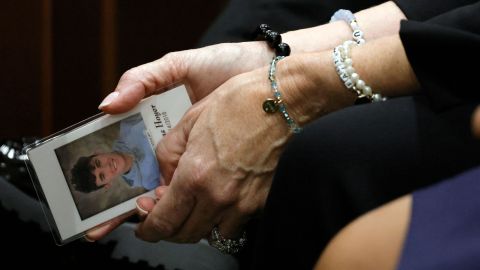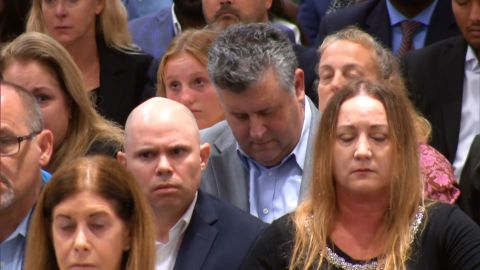CNN
—
Parkland school massacre gunman Nicolas Cruz will be officially sentenced to life in prison this week – but not until the family of the man he killed in 2018 has another chance to face him in court.
“You stole him from us and you didn’t get the justice you deserved,” Debra Hickson, the widow of victim Christopher Hickson, told Cruz in his first statement Tuesday morning, referring to Florida A state jury last month did not recommend his decision to be sentenced to death.
“You got a gift — a gift of grace and mercy,” she added, “and that’s something you didn’t show any of your victims.”
Follow Live Updates: Parkland shooter Nicolas Cruz to be formally sentenced
After months of trial to decide whether Cruz should be sentenced to death, a jury recommended that he receive a life sentence without parole for the shooting at a South Florida high school that killed 17 people, in his defense attorney’s case. He later saved his life arguing that he was a deranged psychopath.
Broward County Circuit Judge Elizabeth Sheller must abide by their decision — three jurors voted against the death penalty, which must be unanimous in Florida — when she sentenced Cruz, 24, who pleaded guilty to 17 counts of murder and murder last year. 17 counts of attempted murder. She is expected to be formally sentenced on Wednesday.
In addition to lamenting his verdict, many who came forward spoke directly to Cruz about how his massacre at Marjory Stoneman Douglas High School affected their lives — the deadliest mass shooting at an American high school despite the fact that the U.S. The scourge of gun violence on campus continues.
“You didn’t know me, but you tried to kill me,” said teacher and survivor Stacey Lipper. “Wednesday, February 14, 2018 at 2:20 pm, the person I was with was different from the person standing here today. I was broken and changed, and I will never see the world the same way again. ”
Alyssa Alhadeff’s grandfather, David Robinovitz, 14, referred to Cruz not by his first name but as a “Parkland killer,” he said. The shooter “wins temporarily”, but one day he will die.
“Back then, Parkland Murderer, I wish you could go meet your maker somewhere,” Robin Nowitz said. “And, Parkland Murderer, I hope your maker sends you straight to hell to burn for the rest of your life.”
As prosecutors concluded their cases this summer, many Parkland families had testified, describing the magnitude of their losses. But, according to the father of 14-year-old victim Jaime Guttenberg, the statements did not include everything the family wanted to say because they had to be reviewed by lawyers for both parties.
“That’s not how we feel,” Fred Gutenberg told CNN last month after the jury’s decision. “We can say whatever we want at the sentencing hearing, including discussing how we feel about this sentence right now.”
The Broward County Attorney’s Office confirmed to CNN in a statement that a second round of victim impact testimony will take place within two days, and that survivors of the shooting will also have a right to speak. It is unclear how many of them or the victims’ loved ones will take a stand, but there is no time limit and some may testify via video conference.
The state attorney’s office said this week’s victim impact statement does not need to be presented to an attorney in advance.
“I still have a lot to say. I still have a lot to say directly to the killer,” Gutenberg told CNN, adding, “We can now tell him exactly how we feel about him. ”

As a result of his guilty plea, Cruz skipped the guilt phase of the trial and went straight to the sentencing phase, where prosecutors seek the death penalty and Cruz-appointed public defenders lobby for life without parole.
To reach their decision, jurors heard months of arguments from prosecutors and defense attorneys over aggravating factors and mitigating circumstances — why Cruz should or should not be executed.
Prosecutors pointed to seven aggravating factors, including killings that were particularly heinous, brutal or cruel, as well as callous, planned and premeditated, and backed their case with evidence that the gunman spent months orchestrating the shooting, revising his AR- 15 to improve his marksmanship and accumulate ammo.
Prosecutors also showed Cruz’s online search history showing how he sought information about past mass shootings, as well as comments he left on YouTube expressing his clear desire to commit mass killings.
“What a man writes,” Attorney General Michael Satz said in closing arguments, “what a man says is a window into someone’s soul.”
But defense lawyers say their client should be sentenced to life in prison, noting that his life’s struggles began even before he was born: They say his biological mother used drugs and alcohol while pregnant with Cruz, leading to a large amount of mental illness and intellectual deficits caused by fetal alcohol spectrum disorder.
Defense attorneys argued that despite his problems — and educators and school counselors who were concerned about his behavior and poor academic performance — Cruz was never adequately or appropriately intervened. That was partly due to his late adoptive mother, defense attorney Melissa McNeill, who said she “never really realized” what was wrong with him.
“Sometimes,” McNeill said in her own closing debate, “the person who least deserves sympathy, grace and remorse deserves it.”

In reaching its decision, the jury unanimously agreed that the state had demonstrated aggravating factors beyond a reasonable doubt — they were sufficient to warrant a possible death penalty.
However, jurors ultimately did not unanimously agree that the aggravating circumstances outweighed the mitigating circumstances, and therefore recommended a life sentence rather than the death penalty.
Three jurors voted against recommending the death penalty, jury foreman Benjamin Thomas told CNN affiliate WFOR – he disagreed with the decision, noting: “I didn’t like how it turned out, but… That’s how the jury system works.”
Thomas said one of the jurors was a “staunch opponent” who couldn’t vote for the death penalty because she “didn’t believe that because he was mentally ill, he deserved the death penalty,” Thomas said. Two more jurors joined her.
Juror Melotti Vanoy told CNN that the woman’s position was “unmoved.” “Whether we spent 10 hours or five days” to consider, “she didn’t feel like she was going to be moved.”
According to CNN, Vanoy himself voted for life, and she was persuaded because she “felt the system had failed” Cruz repeatedly throughout his life.
In any case, the results didn’t do much for families hoping to see Cruz sentenced to death, seeing them as they grappled with the jury’s decision in the hours after the verdict was read. Disappointment turned into anger and confusion.
“I was disgusted by those jurors,” said Ilan Alhadeff, father of student victim Alyssa Alhadeff. “I am disgusted with this system, you can allow 17 people to die and 17 people to be shot without being sentenced to death. What good is our death penalty?”
“This gunman deserves no sympathy,” Tony Montalto, father of the slain 14-year-old girl Gina Montalto, said outside court after the jury’s findings were read .
“Did he show sympathy to Gina when he put the weapon on Gina’s chest and chose to pull the trigger, or any of the other three times he shot her? Was that compassion?”
Not all relatives of the victims felt this way. Before the end of the trial, victim Carmen Schentrup’s brother, Robert Schentrup, told CNN that he opposed the death penalty — in Cruz’s case and all others.
“Logically,” he said, “to me, we’re not going to say, ‘Murdering someone is a horrible, heinous, horrible, horrible thing, and to prove it, we’re going to Do something else to someone.'”